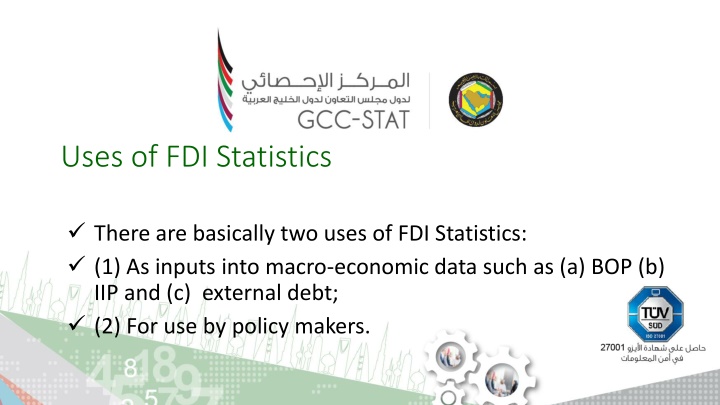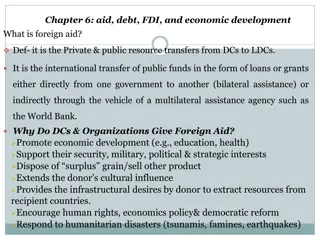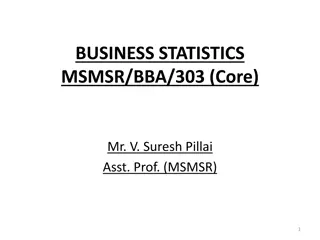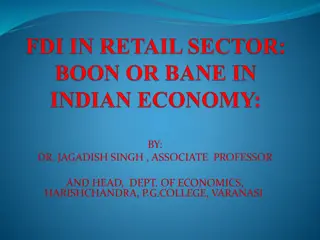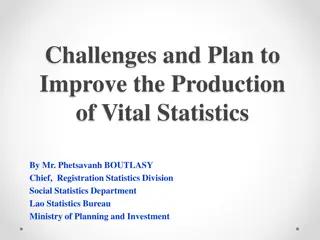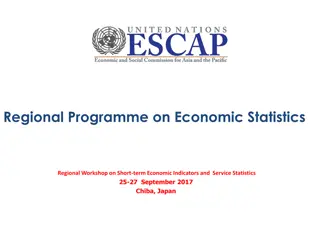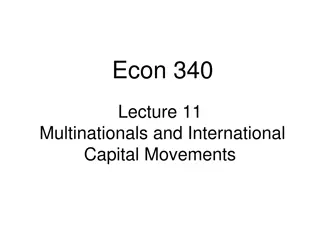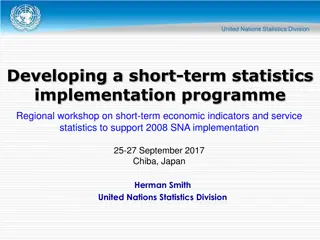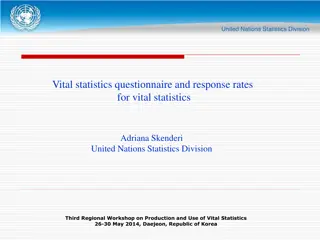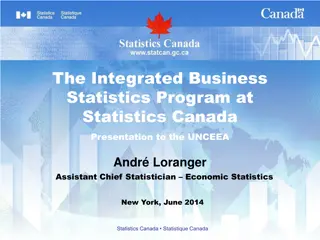Uses of FDI Statistics in Economic Analysis
FDI statistics are essential inputs for macro-economic data such as Balance of Payments (BOP), International Investment Position (IIP), and external debt. They aid policymakers in making informed decisions regarding economic policies. Additionally, macro-economic data related to the external sector includes IIP, BOP, and external debt, which reflect a country's external assets and liabilities. FDI transactions are shown in the BOP, playing a crucial role in financial and current accounts data. Different types of financial transactions, including FDI, FPI, and financial derivatives, are classified within the BOP data. Understanding these statistics is crucial for assessing a country's financial stability and economic health.
Download Presentation

Please find below an Image/Link to download the presentation.
The content on the website is provided AS IS for your information and personal use only. It may not be sold, licensed, or shared on other websites without obtaining consent from the author.If you encounter any issues during the download, it is possible that the publisher has removed the file from their server.
You are allowed to download the files provided on this website for personal or commercial use, subject to the condition that they are used lawfully. All files are the property of their respective owners.
The content on the website is provided AS IS for your information and personal use only. It may not be sold, licensed, or shared on other websites without obtaining consent from the author.
E N D
Presentation Transcript
Uses of FDI Statistics There are basically two uses of FDI Statistics: (1) As inputs into macro-economic data such as (a) BOP (b) IIP and (c) external debt; (2) For use by policy makers.
Uses of FDI Statistics There are basically two uses of FDI Statistics: (1) As inputs into macro-economic data such as (a) BOP (b) IIP and (c) external debt; (2) For use by policy makers.
Macro-economic data related to the external sector of economy. IIP, BOP and the External Debt of any country represent the external sector of the economy of a country; IIP measures the stock of external assets and liabilities of a country; The change in IIP during two consecutive periods is accounted by transactions and other factors caused by price and exchange effects affecting financial instruments, write-offs, migrations of companies and individuals. Transactions represent acquisition or disposition of financial instruments. Transactions and other factors compose flows. Therefore, changes in stock position between periods is caused by flows (transactions + other factors)
Macro-economic data related to the external sector of economy (Contd) The FDI transactions data are shown in the BOP in the financial and current accounts of the BOP data. The financial transactions data are classified functionally as those related to: (a) FDI (b) FPI (c) Financial Derivatives (d) FOI and (e) Reserve assets. Transactions related to the assets and liabilities of a country are measured separately. The maturity profiles of the financial instruments such as short and long-term are also shown; Equity financial instruments are considered long-term although there could be a lot of short term transactions in listed equity securities traded through stock exchanges;
Macro-economic data related to the external sector of economy (Contd) Debt instruments are classified as long and short term; Trading in debt instruments could give a clue about the stability of the financial infrastructure of a country; It is for the above reason that separate detailed data are collected through the external debt data of a country; Reserve accounts data relate to transactions associated with foreign currency assets held by a Central Bank to maintain stability of the currency of a country in relationship to the currencies of other countries;
Macro-economic data related to the external sector of economy (Contd) To prevent financial instability through speculative financial transactions (mostly always short-term transactions), policy makers prefer FDI as they do not seek speculatve profits; However, an exception to the above is speculative movements in real estate; A financial bubble could be created by intense speculation in real estate ownership and the activities of real estate flippers (that is those who buy real estate to hold for a short time and then cashout on the basis of the greater fool theory)
Macro-economic data related to the external sector of economy (Contd) With the exception of certain kind of FDI in real estate, other FDI tend to be for the long-term and hence stable; The current account of the BOP measures the transactions related to trade in goods and services, income generated through wages and salaries, profits and interest and transfer transactions that have no quid pro quo; Some of the current account transactions such as those related to income are identified separately; Foreign trade data of FDI enterprises are not separately identified in BOP data but these data are collected in FIS surveys as in the GCCSTAT CFIS (Activities of the MNEs).
Macro-economic data related to the external sector of economy (Contd) Although current transfers are for consumption purposes, part of the data in current transfers should be classified to the financial account under FDI, FPI, and FOI. Capital transfers are included in the capital account of the BOP; The GCCSTAT FIS is meant to be addressed to all entities in a member country with liabilities to and assets with non-residents; However, investments of individuals are not covered and they tend to be substantial especially with the large proportion of expats resident in these countries;
Macro-economic data related to the external sector of economy (Contd) There are some corporate entities that do not report data (e.g. SWFs) or in some cases report data that are not consistent with the respective data definitions (e.g. PSAs/DSAs); Data gaps and data deficiencies affect the quality of the inputs of FIS into other statistical series such as the BOP, IIP and External Debt; Hence, attention should also be paid to alternate sources of data and constant monitoring of new investments; Qualitatively deficient FIS would not be helpful to policy makers.
Use of FDI data by Policy Makers The following may be identified as of interest to policy makers with regard to FDI data: (a) Sources of investment financing especially for developing countries (direct investors and fellow enterprises); (b) Data provided by FDI enterprises may also provide clue to sources of associated financing of FDI projects by non-FDI enterprises from the home countries of direct investors such as export-Import Banks (usually owned by the governments),and commercial banks with global affiliations
Use of FDI data by Policy Makers (Contd) Access to technology imports (usually from direct investors) but also from fellow enterprises and non-resident third parties; Market access Direct investors already have established markets into which they can sell the products from their new investments. However, under certain circumstances, non-direct enterprises could break into established markets due to demand-supply factors and contacts established through association with FDI enteprises; The situation described above occurs as a result of spin-off effects of FDI;
Use of FDI data by Policy Makers (Contd) One of the spin-off effects occurs when employees in a FDIE, after acquiring sufficient experience and skills may leave it to establish their own businesses that are similar to theFDIE or become significant suppliers of goods and services to the FDIE which may have been sourced from other countries (related enterprises or third parties) Jolibee, the hamburger chain established in the Philippines by the locals has become a MNE, mimicking the business plans of older established hamburger chains such as McDonalds and Burger King in everything excepting in product differentiation by giving the hamburgers an essentially Filipino taste.
Use of FDI data by Policy Makers (Contd) Superior technology protected by patent rights is one of the ways in which FDI enterprises have maintained their rent seeking advantages; Although, technology (constantly improved) was used in the FDIEs, the local employees were seldom allowed to get to master them; in other words there was not any meaningful transfer of technology to the locals; The above situation is changing as seen in the new PSA/DSA agreements between the UAE and the IOCs by which definite stipulations have been made for technology transfer to the locals.
Use of FDI data by Policy Makers (Contd) Creation of jobs, better paying jobs, working conditions (e.g. garment factories) are also of interest to governments and international organizations such as the International Labor Organization (ILO) Desire to develop the hinterland of major metropolis areas and under developed regions of country may motivate direct investors to locate in such areas; Not all FDI bring benefits to the host country. Some may lead to demographic and social dislocation of the citizens of the host country as in the case of real estate investments where citizens may sell their property in choice locations of major cities to developers and move to distant parts, resulting in much time and money spent on transport and other costs, commuting to their work places and social disorientstion caused by leaving familiar surroundings;
Use of FDI data by Policy Makers (Contd) Development of tourist hotels and resorts with facilities to attract non-resident high spenders such as casinos have caused harm to the locals even if legally the citizens are not allowed to gamble. Citizens find a way to gamble in these casinos or set up their own gambling dens, leading to addiction, debt, robbery, enforcement activities for non-payment of gambling debts resulting in injury and death, suicide and break up of families. FDI enterprises in developing countries repatriate their profits and do not systematically reinvest them; Owing to entry barriers, profits of FDI enterprises tend to be rent seeking.
Use of FDI data by Policy Makers (Contd) Policy makers therefore would be interested in knowing not only about the benefits accruing from FDI but also the disadvantages. So while their policies would tend to encourage the beneficial effects, they may also take actions to control or prevent the negative effects on the grounds of cultural, social and religious concerns. Therefore, to satisfy the needs of policy makers, the compilers have to provide reliable data on not only FDI but also on the activities of MNEs. To be useful, the data have to be comprehensive, timely and in accordance with international concepts.
